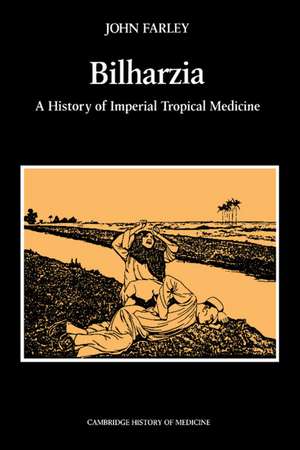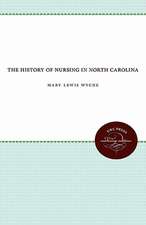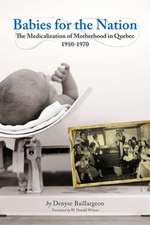Bilharzia: A History of Imperial Tropical Medicine: Cambridge Studies in the History of Medicine
Autor John Farleyen Limba Engleză Paperback – 10 dec 2003
| Toate formatele și edițiile | Preț | Express |
|---|---|---|
| Paperback (1) | 349.34 lei 6-8 săpt. | |
| Cambridge University Press – 10 dec 2003 | 349.34 lei 6-8 săpt. | |
| Hardback (1) | 835.89 lei 6-8 săpt. | |
| Cambridge University Press – 25 iul 1991 | 835.89 lei 6-8 săpt. |
Din seria Cambridge Studies in the History of Medicine
- 5%
 Preț: 842.69 lei
Preț: 842.69 lei - 5%
 Preț: 328.68 lei
Preț: 328.68 lei -
 Preț: 286.69 lei
Preț: 286.69 lei - 5%
 Preț: 403.07 lei
Preț: 403.07 lei - 5%
 Preț: 263.87 lei
Preț: 263.87 lei - 5%
 Preț: 294.37 lei
Preț: 294.37 lei - 5%
 Preț: 837.35 lei
Preț: 837.35 lei - 5%
 Preț: 314.62 lei
Preț: 314.62 lei - 5%
 Preț: 344.98 lei
Preț: 344.98 lei - 5%
 Preț: 199.17 lei
Preț: 199.17 lei - 5%
 Preț: 336.86 lei
Preț: 336.86 lei - 5%
 Preț: 351.56 lei
Preț: 351.56 lei -
 Preț: 277.26 lei
Preț: 277.26 lei - 5%
 Preț: 301.61 lei
Preț: 301.61 lei - 5%
 Preț: 431.51 lei
Preț: 431.51 lei - 5%
 Preț: 422.85 lei
Preț: 422.85 lei - 5%
 Preț: 423.05 lei
Preț: 423.05 lei - 5%
 Preț: 858.07 lei
Preț: 858.07 lei - 5%
 Preț: 283.01 lei
Preț: 283.01 lei - 5%
 Preț: 374.77 lei
Preț: 374.77 lei - 5%
 Preț: 745.59 lei
Preț: 745.59 lei - 5%
 Preț: 435.44 lei
Preț: 435.44 lei - 5%
 Preț: 309.58 lei
Preț: 309.58 lei -
 Preț: 447.05 lei
Preț: 447.05 lei - 5%
 Preț: 307.58 lei
Preț: 307.58 lei - 5%
 Preț: 900.51 lei
Preț: 900.51 lei - 5%
 Preț: 275.09 lei
Preț: 275.09 lei - 5%
 Preț: 399.56 lei
Preț: 399.56 lei - 5%
 Preț: 392.70 lei
Preț: 392.70 lei - 5%
 Preț: 425.23 lei
Preț: 425.23 lei - 5%
 Preț: 404.19 lei
Preț: 404.19 lei - 5%
 Preț: 285.19 lei
Preț: 285.19 lei -
 Preț: 282.87 lei
Preț: 282.87 lei - 5%
 Preț: 306.74 lei
Preț: 306.74 lei
Preț: 349.34 lei
Preț vechi: 367.72 lei
-5% Nou
Puncte Express: 524
Preț estimativ în valută:
66.86€ • 69.06$ • 55.64£
66.86€ • 69.06$ • 55.64£
Carte tipărită la comandă
Livrare economică 26 martie-09 aprilie
Preluare comenzi: 021 569.72.76
Specificații
ISBN-13: 9780521530606
ISBN-10: 0521530601
Pagini: 372
Dimensiuni: 156 x 229 x 23 mm
Greutate: 0.56 kg
Ediția:Revised
Editura: Cambridge University Press
Colecția Cambridge University Press
Seria Cambridge Studies in the History of Medicine
Locul publicării:Cambridge, United Kingdom
ISBN-10: 0521530601
Pagini: 372
Dimensiuni: 156 x 229 x 23 mm
Greutate: 0.56 kg
Ediția:Revised
Editura: Cambridge University Press
Colecția Cambridge University Press
Seria Cambridge Studies in the History of Medicine
Locul publicării:Cambridge, United Kingdom
Cuprins
List of tables and figures; Acknowledgments; 1. Introduction; Part I. The Imperial Approach (1898–World War II): 2. 1898: a declaration of war; 3. 1898: another war, another continent; 4. Bilharzia (1850–1918): the Looss controversies; 5. The International Health Board; 6. Bilharzia: optimism in Egypt (1918–39); 7. Into the 1930s: economics of disease; 8. The 1930s: empires in transition; 9. Bilharzia: World War II; Part II. A Brief Interlude: Social Medicine: 10. New ideas; 11. Bilharzia: pessimism in Egypt (1940–55); 12. Bilharzia: victory in China?; Part III. The Professional Approach (1950–1970s): 13. The new British Empire: finding the experts; 14. South Africa (1950–60): social medicine versus scientific research; 15. Bilharzia: second to only one; 16. Bilharzia (1950–1970s): a strategic change; 17. Conclusion: the imperial triad; Notes; Index.
Recenzii
"...ought to be read, not just by historians and doctors as the blurb suggests, but also by those concerned with the future of populations and the planet." Anne Hardy, Times Higher Education Supplement
"This fascinating work combines the history of scientific investigations of a major human worm parasite and the story of largely ineffectual efforts by Anglo-American imperial powers to eradicate the resulting disease....detailed and lively account...." Choice
"Farley's fine book demonstrates that few areas of medical history are more relevant to present problems than is tropical medicine. This book deserves a wide readership among those interested in medical history, the history of tropical medicine and parasitology, and health care in the Third World." K. David Patterson, BHM
"This very interesting book traces the history of the discovery of the disease; the best methods of control and prevention; and the extent to which financial support for research depended on different governments imperial role and ambitions. There are also interesting side lights on the interactions of the different research workers which indicate that human nature does not change." Gen. Pharmac.
Farley has marshaled impressive amounts of data, and from them he has constructed a fascinating account....illustrates admirably the historiographic value of its approach...." Molly Sutphen, Isis
"...well written, well organized, and generally accurate. I recommend it to those interested in the history of medicine in the tropics." Allen Cheever, Current Surgery
"...an impressive example of interdisciplinary research. It will be welcomed by medical historians, as well as by those interested in the history of imperialism and international development." Randall Packard, Journal of Interdisciplinary History
"Clearly written, Farley's book covers a broad canvas, including the American South, Central America, the Philippines, Rhodesia, South Africa, and China. Avoiding technical language that might drive the non-specialist away, he has taken care to obey the popular implications of his own argument. To make his imperialist critique, he has chosen an eminently suitable topic that never ceases to be interesting and illuminating." Diana Wylie, International Journal of African Historical Studies
"Medical historians, especially those with an interest in tropical medicine, will find this text of enormous interest..." G.C. Cook, Journal of Infection
"...compelling..." The Lancet
"This fascinating work combines the history of scientific investigations of a major human worm parasite and the story of largely ineffectual efforts by Anglo-American imperial powers to eradicate the resulting disease....detailed and lively account...." Choice
"Farley's fine book demonstrates that few areas of medical history are more relevant to present problems than is tropical medicine. This book deserves a wide readership among those interested in medical history, the history of tropical medicine and parasitology, and health care in the Third World." K. David Patterson, BHM
"This very interesting book traces the history of the discovery of the disease; the best methods of control and prevention; and the extent to which financial support for research depended on different governments imperial role and ambitions. There are also interesting side lights on the interactions of the different research workers which indicate that human nature does not change." Gen. Pharmac.
Farley has marshaled impressive amounts of data, and from them he has constructed a fascinating account....illustrates admirably the historiographic value of its approach...." Molly Sutphen, Isis
"...well written, well organized, and generally accurate. I recommend it to those interested in the history of medicine in the tropics." Allen Cheever, Current Surgery
"...an impressive example of interdisciplinary research. It will be welcomed by medical historians, as well as by those interested in the history of imperialism and international development." Randall Packard, Journal of Interdisciplinary History
"Clearly written, Farley's book covers a broad canvas, including the American South, Central America, the Philippines, Rhodesia, South Africa, and China. Avoiding technical language that might drive the non-specialist away, he has taken care to obey the popular implications of his own argument. To make his imperialist critique, he has chosen an eminently suitable topic that never ceases to be interesting and illuminating." Diana Wylie, International Journal of African Historical Studies
"Medical historians, especially those with an interest in tropical medicine, will find this text of enormous interest..." G.C. Cook, Journal of Infection
"...compelling..." The Lancet
Descriere
Professor Farley describes how governments and organizations faced one particular tropical disease, bilharzia or schistosomiasis.









